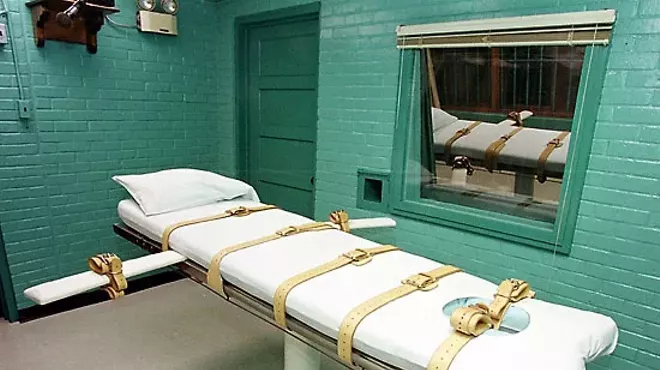Life or Death
Gov. Jay Inslee announced Tuesday he has ordered a moratorium on all death penalty executions for the duration of his term in office. He emphasized the moratorium would not commute or pardon any of the sentences of the nine men on Death Row, but would seek to halt apparent inconsistencies in the application of capital punishment.
"I'm not convinced equal justice is being served," Inslee says in a statement. "The use of the death penalty in this state is unequally applied, sometimes dependent on the budget of the county where the crime occurred."
Inslee announced he would issue a reprieve in any death penalty case sent his office, putting off any executions while he remains governor. In a separate statement, state Attorney General Bob Ferguson confirmed Inslee has the authority to hit the "pause" button on executions.
Regardless of the moratorium, Ferguson says the Attorney General's office will continue to defend existing death penalty convictions and argue against appeals. At least two Death Row inmates have ties to Spokane, including serial killer Robert Lee Yates Jr.
Inslee says he made his announcement following months of research and a visit to Walla Walla State Penitentiary. He says he spoke with community leaders, victim families, prosecutors, law enforcement officials and advocates on both sides of the issue.
"There are too many flaws in the system," Inslee says in a statement. "And when the ultimate decision is death there is too much at stake to accept an imperfect system."
— JACOB JONES
Ag-Gagged in Idaho
A bill prohibiting unauthorized audio and video recordings of agricultural operations will advance to the Idaho Senate floor after the Agricultural Affairs Committee cleared the legislation Tuesday morning.
Backed by Idaho's $2.5 billion dairy industry, the measure is intended to stop animals rights activists from spying on and sabotaging industrial farming activities. Under the bill, anyone who enters an agricultural production facility and surreptitiously records operations would face up to a year of imprisonment and a $5,000 fine. It would also penalize people who lie on farm employment applications.
Two years ago, an employee at Bettencourt Dairies in Hansen, Idaho, working in conjunction with the Los Angeles-based advocacy group Mercy for Animals, filmed a video of workers abusing cows in the milk barn. Three workers were charged with animal cruelty misdemeanors.
At least eight states — including Montana, North Dakota and Utah — have passed so called "ag gag" laws aimed at preventing whistleblowers from making undercover recordings in factory farms.
— DEANNA PAN
Freshmen or Alcohol
After a Washington State University task force spent over a year figuring out how to address campus alcohol problems, WSU president Elson Floyd has issued a major new mandate to fraternities: Fraternities can house freshmen. Fraternities can serve alcohol on-site. But they can't do both.
At the beginning of the 2012 school year, a student fell from a third-story window at the Phi Kappa Tau frat, and another toppled backward off a second-floor railing at Lambda Chi Alpha house. Alcohol contributed to both incidents.
There was also the death of 18-year-old freshman Kenny Hummel after alcohol and energy drinks had sent his blood-alcohol-content levels to a lethal height of 0.40.
The task-force convened by Floyd has led to a host of changes to school policies, including increasing the number of classes on Friday mornings (to cut down on Thursday night drinking) and notifying parents the first time their underage child is caught violating alcohol policies.
"Like any agent of change, the university's decision has been met with mixed feedback from the Greek community," says Cory Hudson Jr., a student serving as the director of public relations for the Interfraternity Council, in an email.
Not every alcohol-related tragedy happens at fraternities, of course. When Hummel was found passed out with alcohol poisoning, he was in his residence hall — which already strictly prohibits underage drinking.
— DANIEL WALTERS




























